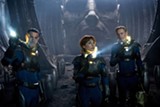[
{
"name": "500x250 Ad",
"insertPoint": "5",
"component": "15667920",
"parentWrapperClass": "",
"requiredCountToDisplay": "1"
}
]
Although the form certainly deserved serious attention practically since its beginnings, Stanley Kubrick's "2001: A Space Odyssey" conferred a certain dignity on science-fiction film. Its length, its cinematography, its soundtrack, its depiction of the machinery of the future, its incomprehensible conclusion, and its determined, dreary pretentiousness provided a wonderful opportunity for the more intellectually inclined critics to discover value in the genre and of course to produce whole galaxies of analysis. The picture also opened the way for other sci-fi flicks to explore Big Topics and Deep Thoughts — most of the "Star Trek" franchise, for example, along with Steven Spielberg's "Close Encounters of the Third Kind," "E.T. The Extra-Terrestrial," and "AI: Artificial Intelligence."
Ridley Scott's original "Alien" employed a highly professional cast, stuck to a tight, thrilling script, mixed gritty authenticity with convincing effects, and featured one of the scariest monsters in film history. Though perhaps not quite at the same level, its sequels continued some of the best subjects and themes as the archetype, without straying far from its initial premise and its despairing subtext. Now, with "Prometheus," the director moves over into the tempting territory of myth and mysticism, where science-fiction, adventure, and horror-flick shocks mingle with discussions of the origins of mankind, of creation itself.
After some puzzling preliminary mumbo-jumbo involving a muscular giant who looks like the Silver Surfer on steroids standing by a waterfall in an unearthly landscape, the picture switches to a future Earth, where two archaeologists, Charlie Holloway (Logan Marshall-Green) and Elizabeth Shaw (Noomi Rapace), discover a cave painting that duplicates an ancient image from cultures all over the world. The pictures all show a figure pointing to a group of five planets, which leads the scientists to believe that visitors from that formation, whom they call Engineers, journeyed to Earth and created human beings. In short, it's the sort of nonsense that UFO nuts use to explain such structures as crop circles, Egyptian pyramids, Angkor Wat, and Stonehenge.
The film then opens again in 2093 on the space ship Prometheus, funded by the withered billionaire Peter Weyland (Guy Pearce, made up like the aged figure at the end of "2001"), where the archaeologists and crew wake from a two-year sleep to land on a distant planet in another galaxy. There they seek nothing less than the origins of life, the creators of mankind, those great Engineers. As any student of science fiction knows, such a quest, no matter how bold, no matter how noble, can only end badly — the original Prometheus, after all, landed on a rock in Hades with an eagle munching on his liver.
On the planet, a hostile place, the explorers discover a huge cave full of strange machinery and a series of disturbing life forms: worms that emerge from the ooze of a cracked container, some awful phallic snakes, and a huge octopus-like creature from which another birth occurs. They also witness a holographic history of sorts, containing clues to the mysteries they hope to solve, that familiar puzzling combination of the mechanical, the biological, and the religious that appears in previous "Alien" encounters.
Everything in "Prometheus," from the shocks and frights to the magnificent sets to the futuristic human technology, operates on a grand scale, much of it an expansion of the familiar material of the series. A three-dimensional, kinetic holograph of the solar system simply dazzles, in part for its sheer grace and beauty, as it also helps to explain something of the scientists' quest.
Once again an artificial human, a bland, smug, superior robot named David (Michael Fassbinder) occupies an ambiguous position, following his own hidden agenda and compromising the mission. Though apparently human, the mission commander, the icy, antiseptically sexy Meredith Vickers (Charlize Theron) matches him in robotic affect; she also plays a most ambiguous role in the crew's search and discovery.
Despite its excursions into metaphysics and teleology, "Prometheus" retains some of the distinctive elements of the "Alien" series, including the depiction of a resourceful and heroic female character, Elizabeth Shaw, and the persistent thematic concern with maternity, which provides one of the most excruciating sequences in the movie. Shaw also appropriately embodies the film's confusion of science, theology, and sheer baloney.
Latest in Movie Reviews
More by George Grella
-

Film Review: "Cake"
Jan 26, 2015 -

Film Review: "American Sniper"
Jan 19, 2015 -

Film Review: "Inherent Vice"
Jan 12, 2015 - More »






